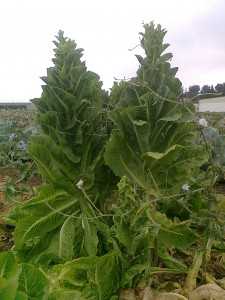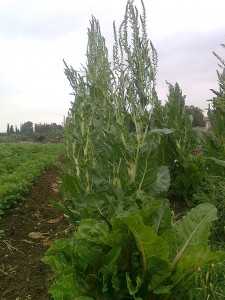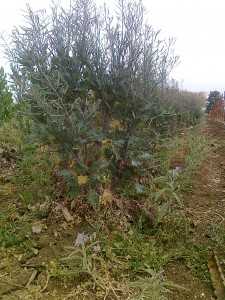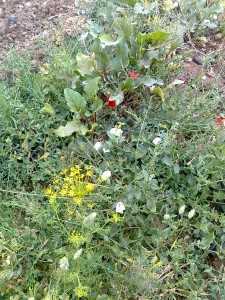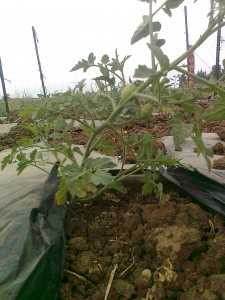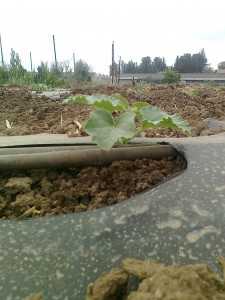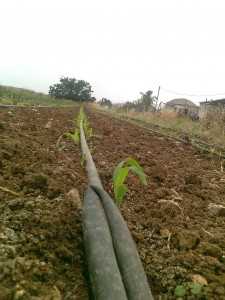Last week we introduced you to Manu the baker, who produces yummy sourdough bread—free of commercial yeast– in her home bakery at Moshav Taoz. The bread undergoes slow rising in refrigeration, for a unique, refined taste.
These breads-by- Manu, now available for delivery in your Chubeza boxes, include:
-
Organic whole wheat bread, leavened from whole wheat culture – 23 NIS
-
Organic spelt (70%) bread with bran, leavened from spelt culture – 26 NIS
-
Three flour breads: organic wheat, organic spelt and organic rye, leavened from whole wheat culture- 24 NIS
-
Sprouted bread from sprouted wheat, spelt and rye, with some whole wheat (70%), organic whole wheat, organic flax, sesame, poppy, sunflowers, millet, and organic oatmeal, leavened from rye culture- 32 NIS
The loaves weigh between 660-680 grams.
Manu will bake the breads on the morning of your delivery day. Orders must be made by the Friday before delivery.
For questions and special requests, please contact Manu by email: [email protected]
___________________________________
Remember that great ensemble that comes to play at our Open Day, The Hazel Hill String Band? Our matchmaker, Howard, told me they will be playing at the monthly contra dance in Jerusalem, this Thursday, May 17. Contra dance is traditional New England folk dance to live music. No experience or partner is needed. Each dance is taught and called by a caller. It’s great fun! The dance begins 8PM, with a beginning lesson upon request at 7:45PM, at Kehilat Mevakshei Derech, Shai Agnon 22 (bus #22.) Admission is only NIS 40; NIS 30 with membership. For more information, please contact [email protected] and if you still need more, take a look at this: http://www.youtube.com/watch?v=_3fBPtrZ00s ___________________________________
Generations Come and Generations Go
For some time now, I’ve been telling you about the interim, transitional period in our field. This time, I decided there’s nothing like the seeing for yourself, so I’m taking this opportunity to take you on a short, photographed tour of the new and veteran vegetable beds.
In springtime, the climate is warmer and thus the growth is quick. This is great for summer vegetables—the squash is ready almost immediately, the melons are chubby and big, and the corn quickly shoots upward. Winter vegetables, however, are a little shocked by this warmth. They, too, speed up their growth, but sometimes we get the feeling they are pushed by a force greater than themselves which doesn’t necessarily take their slow, meditative pace into consideration.
You can see this in the huge beets you’ve been receiving lately. These are young, juicy beets, and they’re oh so sweet, but their enormousness shocks us too when we tug them out of the earth. Their leaves suffer from the heat, are attacked by insects and dry up halfway, so in this period we remove them from their roots and you receive huge, leafless beetroots.
The cauliflower, broccoli and cabbage are all similarly shocked by the heat that rushes them to maturity. As opposed to their buddy, the beet, by now they usually ripen before they have had a chance to grow, and they are extremely sensitive to every delay or tardiness in harvest. This is why you have been getting smaller cabbages and cauliflower. The latest cauliflower is freckled and not as white and shiny as its older siblings harvested a month ago. The cabbage displays his anguish by growing yellow at the outer edges, even while still nestled among its leaves in the bed. The broccoli is a bit jittery as well, as if some of its buds are attempting to look over their friends’ shoulders to find out what all this heat is about! Like the huge beet, they’re all good and yummy, fresh and healthy, but they look like May’s Brassicas.
There are fewer and fewer greens in your boxes, but they’re blooming beautifully in the field. When the bushes of the greens bloom, we stop harvesting. Their leaves become smaller, harder and a lot less tasty. Such was the fate of our kale, most of our Swiss chard (only one bed is still young and strong), and some of our lettuce beds that all ripened at once. They may not be worthy of harvest, but their tall flourish is a sight to behold, and we’re always happy to see the tiny seeds that are emerging there, still green and soon to dry up. There is always something heartwarming about young offspring, of any sort. And here they are at a glance:
A lettuce in bloom
Swiss chard at the peak of its beauty:
Bad hair day for kale:
Those of you with sharp eyes may have noticed that the blooming bushes always hang out with a blooming friend from the wild plant kingdom (the other side of town…) On the field’s edges, where there is no irrigation, the wild plants are already dry and yellow. Inside our field, however, blessed by irrigation pipes, the wild plants are green and going strong in a variety of colors, within the vegetable beds and among them. This is what the edge of a beet bed looks like:
And alongside the mature and blossoming beds, new and young lives are beginning. There are so many, but I chose three representatives to photograph:
The cherry tomatoes bending over in the spring breeze, soon to be supported by trellising vines:
Cucumbers peeking out of their covers:
And the king of summer, corn, blooming in a very long, very green row:
Thus, veterans and wee ones, cultured plants and wild plants are living, blooming, blossoming and growing together in our spring field. May we all have a spring of growth, and a good transition period!
Alon, Bat Ami and the Chubeza team
__________________________________
WHAT’S IN THIS WEEK’S BOXES?
Monday: Broccoli, lettuce, Swiss chard, onions, zucchini, tomatoes, cucumbers, carrots, beets, celery, cauliflower or cabbage
In the large box, in addition: parsley, sweet red peppers, potatoes
Wednesday: Swiss chard, lettuce, onions or scallions, tomatoes, beets, zucchini, cucumbers, carrots, dill or parsley, cauliflower or broccoli, potatoes.
In the large box, in addition: celery, red sweet peppers, cabbage
And there’s more! You can add to your basket a wide, delectable range of additional products from fine small producers: granola and cookies, flour, sprouts, goat dairies, fruits, honey, crackers, probiotic foods, dried fruits and leathers and organic olive oil too! You can learn more about each producer on the Chubeza website. The attached order form includes a detailed listing of the products and their cost. Fill it out, and send it back to us soon.
Note: in the near future there will be many updates from Chubeza’s associate vendors. We will be updating our order form according to what we have in stock, so be sure to open the form through the link for the very latest version.
